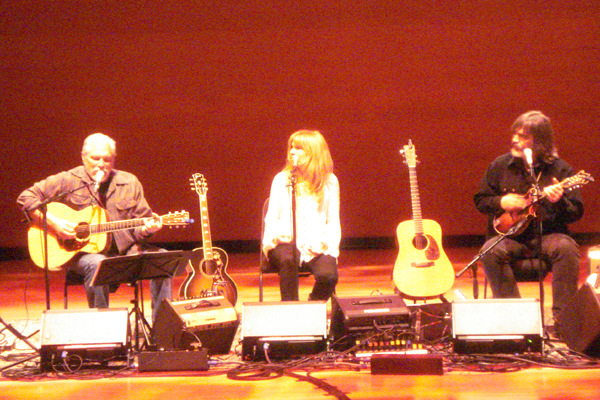
With more than five decades playing guitar, more than 40 fronting his own various ensembles, there are few surprises to a Jorma Kaukonen performance. “Hesitation Blues.” Check. “How Long Blues.” Check. “Good Shepherd.” Check. Yet, for all the known and expected tracks, for the wonderfully steady, deep Piedmont blues saturation, this acoustic performance at the Musical Instrument Museum felt far removed from the typical solo Kaukonen or acoustic Hot Tuna outings of the recent past.
Most notably, Kaukonen was joined by multi-instrumentalist Larry Campbell and vocalist Teresa Williams, who spent years working with Levon Helm. The addition of Williams’ vocals, ranging from robust to sultry to uplifting, and shifting from leads to backing harmonies is not a sound frequently found on stage with Kaukonen. His husky baritone matched wonderfully Williams, whether she let loose a bluesy growl or reaching falsetto for the heavens. Though not on stage the entire night, her additions were intimate and emotional, and certainly warmly received.
Campbell’s stellar accompaniment on guitar, fiddle, mandolin and lap steel, seemed to bring out another side of Kaukonen. He was visibly relaxed and loose enough to allow the talented Campbell—who has toured extensively with both Bob Dylan and Phil Lesh, as well as shoring up Levon Helm’s legendary Midnight Rambles—plenty space to explore and even handle a number of leads. The interplay between the two was at times mesmerizing as the pair traded leads, or Campbell on something other than guitar, added deft fills to Kaukonen’s trademark blues style.
Williams and Campbell—who appear on Kaukonen’s recently issued, Campbell produced, Ain’t No Hurry —opened the show with a rousing 45-minute set that include a number of tracks from the pair’s upcoming album, some Campbell originals, the Farr Brothers fiddle classic “Texas Crap Shooter,” a rollicking “Samson and Delilah” and a bluesy get-down of Johnny Cash’s “Big River” (with accompaniment from Kaukonen).
While the album also features Levon Helm drummer Justin Guip and Hot Tuna bassist Jack Cassidy, this pair proved plenty in filling out and providing depth to this lengthy set of newly recorded and otherwise classic songs. While Kaukonen has often recycled lost blues and folk relics, a few choices seemed surprising, until hearing them performed. The depression-era pair of “Nobody Knows You When You’re Down And Out,” and “Brother Can You Spare A Dime” both felt as raw and anguished as the originals intended back in the day, the former thoroughly wrenching with Campbell’s fiddle touches; the latter even more so as Kaukonen accentuated the minor chord pain in slow blues style and raspy voice. Also from the album, “Where There’s Two There’s Trouble,’ with interlocking harmonies, became a gospel send up, while the Carter Family’s “Sweet Fern” took a more melancholy old-time bluegrass approach with Williams backing vocals the sweetness and light to Kaukonen’s darker edge. “Season’s in the Field,” a solo Kaukonen feature, was a bluesy stumble, a poem turned song that was gripping.
Throughout the set Kaukonen pulled out some choice and less frequently performed numbers including Reverend Gary Davis’ “Children of Zion,” transformed into a spiritual masterpiece, Lightning Hopkins slow burning folk blues wonder, “Come Back Baby” and the steady train-in-the-night blues ride of “I Know You Rider.” The audience in this perfectly constructed acoustical hall were also treated to the funky “Barbeque King,” “Let Us Get Together Right Down Here,” and what may have been the highlight for many, a trip back to 1967 for Jefferson Airplane’s “Good Shepherd.” Pretty much a staple at Kaukonen concerts, the addition of Campbell on guitar added a fresh dimension seldom encountered on the track these days. Complex, weaving and as psychedelic as folk rock ever was, Kaukonen and Campbell played verse, rhythm and lead off each other, shifting focus, tempo and space to create a version as full of tension as it was release.
There was more, but it was these kinds of moments that made this concert unexpectedly special, that attention to song detail beyond the usual exceptional playing, which would have sufficed for many. Williams’ voice—and she sang the closing “Sugaree” perhaps better than Jerry ever could—rounded out Kaukonen’s rougher edges and oft-half-spoken vocals. Campbell’s masterful, respectful accompaniment, be it dynamic or politely restrained, only bettered these already great songs.
Expected? Not entirely. Happy? Completely!


No Comments comments associated with this post